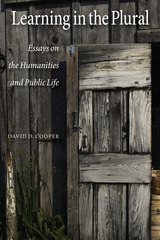
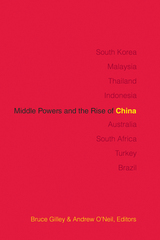
China’s rise is changing the dynamics of the international system. Middle Powers and the Rise of China is the first work to examine how the group of states referred to as “middle powers” are responding to China’s growing economic, diplomatic, and military power. States with capabilities immediately below those of great powers, middle powers still exercise influence far above most other states. Their role as significant trading partners and allies or adversaries in matters of regional security, nuclear proliferation, and global governance issues such as human rights and climate change are reshaping international politics.
Contributors review middle-power relations with China in the cases of South Korea, Malaysia, Thailand, Indonesia, Australia, South Africa, Turkey, and Brazil, addressing how these diverse nations are responding to a rising China, the impact of Chinese power on each, and whether these states are being attracted to China or deterred by its new power and assertiveness. Chapters also explore how much (or how little) China, and for comparison the US, value middle powers and examine whether or not middle powers can actually shape China’s behavior. By bringing a new analytic approach to a key issue in international politics, this unique treatment of emerging middle powers and the rise of China will interest scholars and students of international relations, security studies, China, and the diverse countries covered in the book.
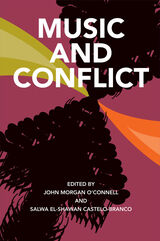
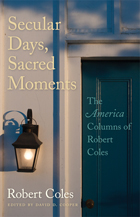
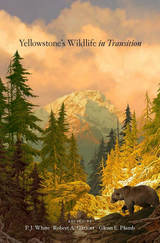
The world's first national park, Yellowstone is a symbol of nature's enduring majesty and the paradigm of protected areas across the globe. But Yellowstone is constantly changing. How we understand and respond to events that are putting species under stress, say the authors of Yellowstone's Wildlife in Transition, will determine the future of ecosystems that were millions of years in the making. With a foreword by the renowned naturalist E. O. Wilson, this is the most comprehensive survey of research on North America's flagship national park available today.
Marshaling the expertise of over thirty contributors, Yellowstone's Wildlife in Transition examines the diverse changes to the park's ecology in recent decades. Since its creation in the 1870s, the priorities governing Yellowstone have evolved, from intensive management designed to protect and propagate depleted large-bodied mammals to an approach focused on restoration and preservation of ecological processes. Recognizing the importance of natural occurrences such as fires and predation, this more ecologically informed oversight has achieved notable successes, including the recovery of threatened native species of wolves, bald eagles, and grizzly bears.
Nevertheless, these experts detect worrying signs of a system under strain. They identify three overriding stressors: invasive species, private-sector development of unprotected lands, and a warming climate. Their concluding recommendations will shape the twenty-first-century discussion over how to confront these challenges, not only in American parks but for conservation areas worldwide. Highly readable and fully illustrated, Yellowstone's Wildlife in Transition will be welcomed by ecologists and nature enthusiasts alike.
READERS
Browse our collection.
PUBLISHERS
See BiblioVault's publisher services.
STUDENT SERVICES
Files for college accessibility offices.
UChicago Accessibility Resources
home | accessibility | search | about | contact us
BiblioVault ® 2001 - 2024
The University of Chicago Press









